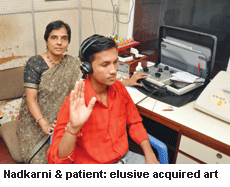Professionally qualified speech therapists and audiologists are in short supply in hospitals, clinics, rehab centres, government health centres, research labs and special schools
In the contemporary new age of communication, with mass media, video-conferencing and public speaking assuming critical importance for business and personal advancement, the role of speech and language thera-pists and audiologists has expanded significantly. From a simple lisp to a major speech defect, professional speech and language therapists are trained to correct them all.
Speech pathology and audiology are classified as healthcare careers, for which professional training is an essential pre-requisite. Speech and language therapists treat people suffering from articulation and swallowing disorders. As specialists, they cover a wide range of problems such as stammering and stutt-ering; helping stroke or brain trauma patients regain lost language and speech; aiding children and adolescents suffer-ing from speech disorders. They rectify speaking disabilities therapeutically and, if necessary, enlist the aid of psychologists/psychiatrists. They also work with families on treatment techniques and behaviour modifications at home to improve communication.
Audiologists, on the other hand, who work closely with speech therapists, measure hearing ability, identify hearing disorders, devise rehabilitative progra-mmes, assess amplification devices, provide training in lip reading and serve as consultants to government and industry on issues related to noise pollution and noise-induced hearing loss. Speech, language and audio scientists investigate the complex proce-sses underlying human communication to develop new rehab programmes for speech and learning challenged individuals.
For compassionate students with an interest in science, medicine and psychology, this is a good career option. The starting point is usually Plus Two with physics, chemistry, mathematics and biology. A three-year bachelors degree in speech and language pathology (BASLP) or audiology & speech rehabilitation (B.Sc ASR) is offered by some universities. A Masters degree (MASLP or M.Sc ASR) is a good launch pad for careers in teaching and research.
Some 20 universities in India provide speech pathology and audiology programmes accredited by the Rehabilitation Council of India. Admission is on the basis of Plus Two grades or entrance test results. Among the highly reputed institutions offering these study programmes are Ali Yavar Jung National Institute for Hearing Handicapped, Mumbai; BYL Nair Charitable Hospital, Mumbai; All India Institute of Medical Sciences, New Delhi; Postgraduate Institute of Medical Education and Research, Chandigarh 160012; National Institute of Physiotherapy & Communication Disorders, Patna 800003; All India Institute of Speech and Hearing, Mysore 570006; Osmania University, Hyderabad; University of Madras, Chennai; Dr. S.R. Chandrashekhar Institute of Speech and Hearing, Bangalore 560084; Kasturba Medical College, Manipal 576119; The Gujarat University, Ahmedabad; Institute of Health Sciences, College of Speech and Hearing, Mangalore 575001.
 For professionally qualified speech therapists and audiologists, there’s no dearth of employment opportunities. They are in short supply in hospitals, clinics, rehabilitation centres, govern-ment health facilities, science research laboratories and special schools. And they also have the option of private practice after a few years of experience. Demand for speech therapists is expected to grow rapidly with medical advances leading to evolution of new treatment techniques. For newly quali-fied professionals, starting salaries range between Rs.10,000-15,000 per month with the prospect of quick advancement.
For professionally qualified speech therapists and audiologists, there’s no dearth of employment opportunities. They are in short supply in hospitals, clinics, rehabilitation centres, govern-ment health facilities, science research laboratories and special schools. And they also have the option of private practice after a few years of experience. Demand for speech therapists is expected to grow rapidly with medical advances leading to evolution of new treatment techniques. For newly quali-fied professionals, starting salaries range between Rs.10,000-15,000 per month with the prospect of quick advancement.
“Natural as it may seem, the ability to speak is an acquired art that eludes millions suffering comprehension, stammering, voicing, feeding and swallowing disabilities. With increased awareness of the importance of oral communication, there’s growing demand for qualified speech therapists and audiologists within and outside the country,” says Dr. Jyotsna Nadkarni, who has a flourishing private practice in speech and language therapy spanning three decades, and is a visiting practitioner at Mumbai’s Bombay and Sion hospitals.
After graduating in audiology and speech and language pathol-ogy (BASLP) from Nair Hospital, Mumbai, Nadkarni established a private clinical practice in Dadar, Mumbai and seven years later inaugurated a second clinic in the suburb of Sion. Also rendering public service simultaneously as an honorary speech and language pathologist in Bombay and Sion hospitals, Nadkarni ministers to 30 patients every day. In her long career she has treated celebrities including singers, actors, and orators with speech problems including vocal fatigue and voice nodules, and has even successfully rehabilitated several patients felled by paralytic strokes and suffering speech loss or slurred speech.
“For those interested in humanitarian vocations, this is a great profession and closely allied with healing and medicine. And it offers opportunities for advancement and innovation,” sums up Nadkarni.
Indra Gidwani (Mumbai)